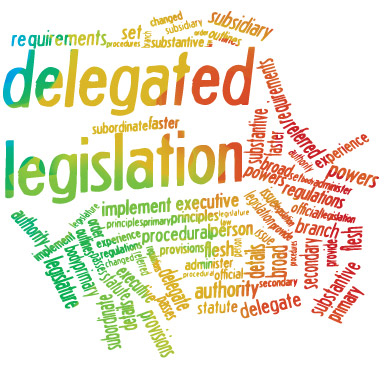7 Government ministers
Listen to this audio which explores the different types of legislation that exist and explains how law making powers may be delegated by either the Scottish of UK Parliaments.
Overviews of law making often overlook the fact that delegated legislation (also referred to as subordinate or secondary legislation) is used to give ministers, both of the Scottish and UK Governments, power to make law. In some cases they have quite significant power which has been delegated to them by the Scottish or UK Parliaments.
In terms of sheer volume the most significant source of law within the UK is delegated legislation. Acts of Parliament (Scottish or UK) frequently delegate law making powers to ministers. The Acts (known as primary legislation) set out the general framework and delegate the power to make detailed legally enforceable provisions to ministers. The powers given to ministers range from technical matters, such as altering the level of a fine, to fleshing out Acts with greater detail. Such delegated legislation allows a government (whether Scottish or UK) to make changes to a law without needing to push through a completely new Act of Parliament.
In the case of UK ministers there is often a lack of detailed scrutiny as the processes for scrutinising and making delegated legislation in the UK Parliament are more complex than those of the Scottish Parliament. The House of Lords has a committee process for the scrutiny of delegated legislation and considers over 1200 pieces of delegated legislation a year. The House of Commons does not have a similar process.
The Committee system used in the Scottish Parliament does not mirror that of the UK Parliament. It is more open and transparent and the committee process is more firmly entrenched in the law making process.
Many arguments are made in support of this method of law making as it saves parliamentary time and allows expertise to be drawn upon in making detailed regulations. However it means that much of our law is being developed without full parliamentary scrutiny or wider public discussion. One of the concerns expressed about the plans for exiting the European Union relates to the use of delegated legislation with some commentators estimating that about 15,000 new laws may be made in this way.

